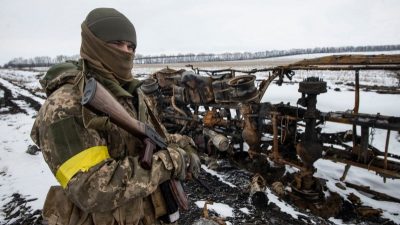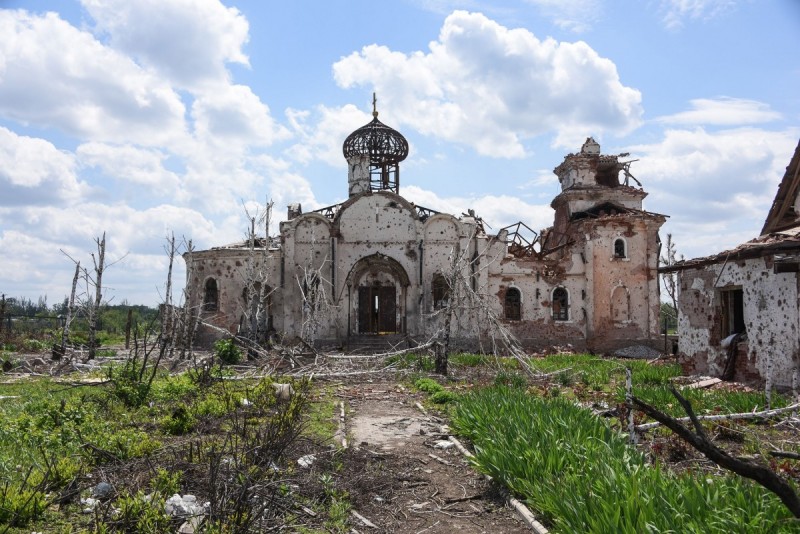A Realist Take on the Ukraine War
Cutting through emotional responses and the distortions of propaganda

All Global Research articles can be read in 51 languages by activating the “Translate Website” drop down menu on the top banner of our home page (Desktop version).
To receive Global Research’s Daily Newsletter (selected articles), click here.
Visit and follow us on Instagram at @globalresearch_crg and Twitter at @crglobalization. Feel free to repost and share widely Global Research articles.
***
Realism is a theory and approach to the study of international relations. Its main assumptions are that all nation states seek security within a generally anarchic (no overall authority) international system, and that national decision makers tend to act in a rational manner. The late Kenneth Waltz, an American political scientist who was a member of the faculty at both the University of California, Berkeley and Columbia University, is the leading purveyor of what is known as defensive realism, in which states maintain careful and reserved policies. By comparison, offensive realism proposes that states actually seek security through maximizing their power position—security through dominance. This way of looking at the world can provide useful insights that cut through emotional responses and the distortions of the inevitable propaganda, particularly with respect to the ongoing war between Russia and Ukraine.
Overwhelmingly, Western commentators have identified Russia as an aggressive actor, but this is normal in any such conflict: “we” are always said to be responding to “their” aggression. Correspondingly, the same position (reversing who is “we” and who is “they”) is being taken by official Russian commentators and their media and propaganda organs. National opponents are also usually vilified, as with the “Huns” (Germans) in the First World War, who were said to be bayoneting babies, the Japanese who were depicted as sub-human in Second World War propaganda, and more recently Iraqi soldiers “throwing babies from incubators” (a lie told by the daughter of the Kuwaiti ambassador to the United States after being prepared by public affairs group Hill and Knowlton), or the Iraqi state producing the fictitious “weapons of mass destruction,” or the Libyan leader Muammar Gaddafi, who was said to be attacking unarmed civilians during protests in 2011 (proven incorrect).
Another part of this is to claim it was Russia that attacked Georgia in their war of 2008, when in fact an investigation by the European Union found Georgia responsible for triggering that conflict. As the saying goes, truth is the first casualty of war. Opposition leaders may also be vilified, ridiculously being compared to the monster Hitler or being cast as “autocrats” even if they are duly elected. This is all par for the course and should be dismissed in any serious analysis.
No conflict “just happens,” it is an historical process and therefore we must look at that process. I propose that we start with the collapse of the Soviet Union; a time when the “peace dividend” was widely proclaimed. It has now been comprehensively documented that a number of US state officials made explicit promises that with the unification of Germany the Western NATO alliance would not move any further east. Instead, a neutral Eastern Europe was envisaged, especially by the Russians, as a way of ensuring an enduring peace. With the collapse of Russia into a depression worse than that suffered by the US in the 1930s, and the weakness of the Russian leadership of Boris Yelstin, such considerations were thrown aside.
In 1999 the Czech Republic, Hungary and Poland joined the ranks of NATO members. In 2004, Bulgaria, Romania, Slovakia, and the Baltic states of Lithuania, Latvia and Estonia were added; with Latvia and Estonia sharing borders with the main part of Russia—the latter not far away from the major Russian city of St. Petersburg. Several years later, at the 2007 Munich Security Conference, Russian President Vladimir Putin explicitly stated his discomfort and alarm at the eastward march of NATO. His concerns were rejected out of hand by the West. Then came the 2008 war with Georgia, which was partly triggered by tensions arising from Georgian President Mikheil Saakashvili seeking NATO membership. At this time, Belarus was ruled by Alexander Lukashenko, a dictator who attempted to balance between East and West, while Ukraine was governed by the Western-leaning Viktor Yushchenko (after the 2004 Orange Revolution that led to the overturning of the election of the Russian-leaning Viktor Yanukovych) who stated a desire to join the EU and NATO. Russia’s concerns about having a large Western-aligned state only 500 kilometres from Moscow were partly assuaged with the election of Yanukovych in 2010.
Then came the fateful events of 2014, as Yanukovych struggled to balance between the EU and Russia, leading to his rejection of an EU association agreement that would have significantly damaged trade relations with Russia and aligned Ukrainian foreign policy more with that of the West. At this time, a compromise agreement between the EU and Russia would have maintained the balance in Ukraine and helped allay Russia’s security concerns, but that was not forthcoming.
At this point we should stop and think about what the response of the US would have been to, for example, a Cold War alliance between Canada and the Soviet Union. Indeed, any reasonable person would assume either a US-inspired coup or an outright invasion. Belarus and Ukraine are to Russia what Canada and Mexico are to the US. Instead of a compromise agreement, the elected president of Ukraine was deposed in a coup—openly supported by Western politicians and diplomats who spent significant time in Maidan Square egging the protesters on—that installed an extremely anti-Russian administration. Imagine Russian politicians and diplomats publicly endorsing protestors against the current Canadian government who amassed outside parliament last month. Of course, the US would be extremely concerned, just as Russia was in 2014.
In response to the Maidan coup, Russia acted to maintain its national interests, including its massive naval base in Crimea. The debate over whether this was a breakaway region freely voting to join Russia or an annexation of Ukrainian territory by Russia is an endless one, but it is pointless from a realist point of view. Russia secured its security by maintaining its naval base in the Black Sea and making sure that such a base did not fall into the hands of the West. Russia also supplied arms and support to the two breakaway republics in the southwestern Donbas region, full of Russian speaking Ukrainians who did not wish to be ruled by a Ukrainian nationalist government.

Remains of an Eastern Orthodox church after shelling near Donetsk International Airport, eastern Ukraine, May 18, 2015. Photo by Mstyslav Chernov/Wikimedia Commons.
Since 2014 Ukraine has become increasingly aligned with the West, signing the EU association agreement and accepting extensive military training, coordination and munitions from Western nations, including Canada. Its leaders have increasingly called for membership of both the EU and NATO, with those calls escalating recently with little pushback from the West. Last year Putin stated Russia’s security redlines, which included a Ukraine in NATO, but again these were treated with disdain. Even his promises of a “military-technical” response by Russia were not heeded, and the Ukrainian president’s calls for Ukraine to become a nuclear power were not rejected by Western leaders.
Ultimately, Russia acted out of its rational self-interest after all of its calls for a non-military resolution to its legitimate, and actually existential, security concerns had been rejected. Russia invaded Ukraine and will turn it into a Russia-aligned nation, securing its own security; any commentators who think that Russia is not militarily capable of doing such a thing are ignorant of the basic facts on the ground and the Russian military.
All war is of course a horrible thing, as is the ongoing genocidal war in Yemen by a Saudi Arabia that Canada arms, as was the illegal war of aggression against Iraq by our ally the US, and as was the destruction of the state of Libya by NATO. Those who cry out against the civilian deaths in Ukraine must take time to consider why those other deaths aren’t as important, just as with the over 13,000 civilian deaths in the Donbas in the last eight years caused chiefly by Ukrainian government forces and pro-Kyiv militias. The answer is of course that they are not different, just some of the killing is done by those our state considers to be allies and some by those it considers to be enemies.
A realist analysis puts such considerations to one side and allows us to rationally assess what actions are appropriate; just as cooler heads prevailed during the Cuban missile crisis in 1962 and saved the world from nuclear annihilation. To get lost in our own propaganda is incredibly dangerous when our opponent is a nuclear power capable of ending human civilization.
This should be a time for reflection on the Western policy establishment’s responsibility for creating an existential threat to Russia that should have been expected to lead to a major response. The sanctions currently being leveled against the Russian economy are unlikely to dissuade Putin, and Russia has extensively prepared for them; it is a massive exporter of raw materials that the world cannot do without, and the ‘international community’ outside the West has refused to sanction Russia.
The extensive damage to Western economies, especially Europe, through the range of sanctions enacted, are currently being exacerbated through the theft of Russia’s foreign exchange reserves. The West benefits hugely from the current global financial system based upon the US dollar, but it has now been displayed that the West thinks nothing of outright theft and financial warfare. The previous cases of Iran, Venezuela, and Afghanistan were relatively small. The case of Russia is large enough to catch other nation’s attention and lead them to create a parallel financial system.
What’s more, Western statements of support, no matter how fulsome, come to nothing when a real war starts with a country that possesses a highly competent military and nuclear weapons. Ukraine in reality is on its own against Russia, no matter how many Western sanctions are implemented or how much material is provided. Other nations will take note of this.
Reflection does not seem to be in order though, as the US has threatened nations who have refused to sanction Russia. The most profound outcome of such threats may be a reconciliation of India with China, and a closer relationship between India and its erstwhile ally Russia. This is not 1995, and the West can no longer push nations such as India around without significant blowback.
After the Cuban missile crisis, the US leadership realized that it must treat the Soviet Union with some respect if nuclear war was to be averted. The West must now learn to respect other nation’s security needs if it wants to avoid becoming increasingly separated from the rest of the world. As the philosopher Mike Tyson put it so well, “Everyone has a plan until they get punched in the mouth.” The Russian invasion is the West’s punch in the mouth, and it desperately needs a new plan.
*
Note to readers: Please click the share buttons above or below. Follow us on Instagram, @globalresearch_crg and Twitter at @crglobalization. Feel free to repost and share widely Global Research articles.
Roger Boyd is a Fellow at the Balsillie School of International Affairs. Prior to completing his doctoral studies he spent 25 years as an executive in the financial industry, and authoured a book exploring the links between the energy and financial systems. The views expressed in this article are those of the author and do not necessarily represent those of the Balsillie School.
Featured image: A Ukrainian servicemen stands by a burned military vehicle near Sytniaky, Ukraine, March 3, 2022. Photo courtesy General Staff of the Armed Forces of Ukraine/Facebook.

